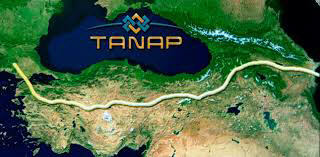|
TANAP - Trans-Anatolien-Pipeline
Rival Russian scheme could complicate
future Caspian gas exports
March 19, 2015 + + +
A ceremony took place in Kars in eastern Turkey on Tuesday to mark the
ground breaking for the Trans-Anatolian Pipeline (TANAP) project.
According to analyst Wood Mackenzie, this is an important step in the
15-year process to export gas from the Azeri sector of the Caspian Sea to
central and western Europe, providing an alternative to a reliance on
Russia gas supplies.
TANAP will transport 16 bcm/yr (565 bcf/yr) of
Shah Deniz Phase 2 gas from 2019. Of this volume, 6 bcm (212 bcf) is
destined for Turkey while the remaining 10 bcm (353 bcf) will head farther
west via the new Trans-Adriatic Pipeline (TAP), comprising 8 bcm to Italy
and the remainder to Greece and Bulgaria.
BP and Turkish utility BOTAS
formalized their entry into the project last week. Azeri state oil company
SOCAR now holds a 58% operating stake, with BP and BOTAS owning 12% and
30%, respectively.
SOCAR plans to increase the pipeline’s capacity from
16 bcm to 31 bcm annually by 2026. However, numerous factors could impact
future expansion plans, Wood Mackenzie cautions.
Samuel Lussac, Caspian
Upstream research manager, said: “Today’s ceremony confirms the Southern
Gas Corridor is on schedule. The TANAP pipeline provides Europe with a new
supply option from 2019. It also opens new markets, beyond Turkey, for
Azerbaijan and operators in the Caspian Sea. “However, future supply
beyond Shah Deniz will take time to develop and the project will have to
face up to Gazprom’s clear intent to retain its market share in Europe
through the Turkish Stream project.” The analyst points out that
Azerbaijan’s offshore gas fields are complex and expensive to develop, and
exploration and appraisal in the landlocked Caspian Sea is also hampered
by limited rig availability.
Gazprom’s Turkish Stream project poses
further risks to TANAP expansion because both pipelines will terminate at
Ipsala, also the starting point for the TAP taking gas to Europe from the
Shah Deniz field.
TAP’s initial capacity is exempt from third-party
access (TPA) for the next 25 years, but the European Commission has ruled
out TPA exemption for future TAP expansion. This means any future upstream
project designed to capitalize on TANAP expansion will have to compete
with Russian gas to access infrastructure west of Turkey.
Wood
Mackenzie estimates the cost of TANAP’s construction at around $12
billion, so the project’s commercial attraction also depends on future
expansion.
Source:
Offshore Magazine
|

Worldwide more than
90,000 paid subscriptions

Worldwide
more than 48,000 subscriptions -
100% one-year direct request
qualification

'What's New' in Upstream, Midstream and
Downstream Products & Services. Circulation 37,000
PennWell
Petroleum Group:
Oil & Gas Journal
Oil & Gas Journal Russia
OGJ_eNewsletter
OGJ-Website-Statistics
Oil, Gas & Petrochem Equipment
Offshore Magazine
Offshore
Russia
Offshore eNewsletter
Offshore
Website Statistics
Oil & Gas Financial Journal
+ + +
For more information, media
kits or
sample copies please contact
Andreas
Sicking
+49 (0)2903-338570
wilhelms@pennwell.com
www.sicking.de
|


